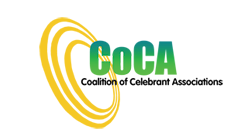CHCCEL402A Establish and maintain knowledge of legal responsibilities of a marriage celebrant
(Note: pre-requisite: CHCCEL401CB)
Essential knowledge:
The candidate must be able to demonstrate essential knowledge required to effectively do the task outlined in elements and performance criteria of this unit, manage the task and manage contingencies in the context of the identified work role
These include knowledge of:
Marriage Act:
knowledge of the obligations and responsibilities of a marriage celebrant according to the Marriage Act and Marriage Regulations and Code of Practice
knowledge of all documentation which must be sighted before a marriage can take place
knowledge of offences under the Marriage Act
Other Legislation
general knowledge of aspects of Commonwealth Migration, Privacy, Trade Practices, Commonwealth Statutory Declarations and Copyright Acts relevant to performing the role of a marriage celebrant
awareness of Commonwealth discrimination laws as well as those in each state and territory
knowledge of the processes and procedures of State/territory Registrars of Births, Deaths and Marriages
Statutory Declarations Act 1959 (Cwlth):
detailed knowledge of responsibilities in accepting a Commonwealth Statutory Declaration
Migration Act 1958:
broad understanding of immigration laws and the issues that may arise for parties who do not have permanent residency status and wish to marry
awareness that marriage does not automatically give permanent residency
Copyright Act 1968 especially applicability of the use of material in ceremonies
Privacy Act 1988
understanding that celebrants have an obligation to protect privacy and maintain confidentiality
Trade Practices Act 1974
understanding of obligations relevant to operating as a marriage celebrant within the Trade Practices Act; and
knowledge of where to locate relevant information
Marriage/relationship education services – knowledge of pre-marriage and other relationship education services
Knowledge of sources of legal and practical information
CHCCEL403A Develop an effective relationship with a marrying couple
Essential knowledge:
The candidate must be able to demonstrate essential knowledge required to effectively do the task outlined in elements and performance criteria of this unit, manage the task and manage contingencies in the context of the identified work role
These include:
Knowledge of sources of legal and practical information;
Understanding and awareness of cultural rights, multicultural contributions, and the place of the arts in culture and ceremony
Knowledge of the importance of ceremony and ritual in community and family life
Understanding of client liaison techniques
Understanding of and a commitment to ongoing professional development
Elements of conducting an effective ceremony including use of additional materials
Basic knowledge of stages of human development and recognise potential impacts on the marrying couple's expectations of the celebrant and each other
The candidate must also be able to apply knowledge outlined in CHCCEL402A Establish and maintain knowledge of legal responsibilities of a marriage celebrant, including:
Marriage Act:
knowledge of the obligations and responsibilities of a marriage celebrant according to the Marriage Act and Marriage Regulations and Code of Practice
knowledge of all documentation which must be sighted before a marriage can take place
knowledge of offences under the Marriage Act
Other Legislation
general knowledge of aspects of Commonwealth Migration, Privacy, Trade Practices, Commonwealth Statutory Declarations and Copyright Acts relevant to performing the role of a marriage celebrant
awareness of Commonwealth discrimination laws as well as those in each state and territory
knowledge of the processes and procedures of State/territory Registrars of Births,Deaths and Marriages
Statutory Declarations Act 1959 (Cwlth):
detailed knowledge of responsibilities in accepting a Commonwealth Statutory Declaration
Migration Act 1958:
broad understanding of immigration laws and the issues that may arise for parties who do not have permanent residency status and wish to marry
awareness that marriage does not automatically give permanent residency
Copyright Act 1968 especially applicability of the use of material in ceremonies
Privacy Act 1988
understanding that celebrants have an obligation to protect privacy and maintain confidentiality
Trade Practices Act 1974
understanding of obligations relevant to operating as a marriage celebrant within the Trade Practices Act; and
knowledge of where to locate relevant information Marriage/relationship education services – knowledge of pre-marriage and other relationship education services
CHCCEL404A Plan a marriage ceremony in line with legal requirements
Essential knowledge:
The candidate must be able to demonstrate essential knowledge required to effectively do the task outlined in elements and performance criteria of this unit, manage the task and manage contingencies in the context of the identified work role
These include:
Knowledge of sources of legal and practical information
Understanding and awareness of cultural rights, multicultural contributions, and the place of the arts in culture and ceremony
Knowledge of the importance of ceremony and ritual in community and family life
Understanding of client liaison techniques
Understanding of and a commitment to ongoing professional development
Elements of conducting an effective ceremony including use of additional materials
The candidate must also be able to apply knowledge outlined in CHCCEL402A Establish and maintain knowledge of legal responsibilities of a marriage celebrant, including:
Marriage Act:
knowledge of the obligations and responsibilities of a marriage celebrant according to the Marriage Act and Marriage Regulations and Code of Practice
knowledge of all documentation which must be sighted before a marriage can take place
knowledge of offences under the Marriage Act
Other Legislation
general knowledge of aspects of Commonwealth Migration, Privacy, Trade Practices, Commonwealth Statutory Declarations and Copyright Acts relevant to performing the role of a marriage celebrant
awareness of Commonwealth discrimination laws as well as those in each state and territory
knowledge of the processes and procedures of State/territory Registrars of Births, Deaths and Marriages
Statutory Declarations Act 1959 (Cwlth):
detailed knowledge of responsibilities in accepting a Commonwealth Statutory Declaration
Migration Act 1958:
broad understanding of immigration laws and the issues that may arise for parties who do not have permanent residency status and wish to marry
awareness that marriage does not automatically give permanent residency
Copyright Act 1968 especially applicability of the use of material in ceremonies
Privacy Act 1988
understanding that celebrants have an obligation to protect privacy and maintain confidentiality
Trade Practices Act 1974
understanding of obligations relevant to operating as a marriage celebrant within the Trade Practices Act
knowledge of where to locate relevant information Marriage/relationship education services – knowledge of pre-marriage and other relationship education services
CHCCEL405A Conduct and review a marriage ceremony in line with legal requirements
Essential knowledge:
The candidate must be able to demonstrate essential knowledge required to effectively do the task outlined in elements and performance criteria of this unit, manage the task and manage contingencies in the context of the identified work role
These include:
Knowledge of sources of legal and practical information;
Understanding and awareness of cultural rights, multicultural contributions, and the place of the arts in culture and ceremony
Knowledge of the importance of ceremony and ritual in community and family life
Understanding of client liaison techniques
Understanding of and a commitment to ongoing professional development
Elements of conducting an effective ceremony including use of additional materials
The candidate must also be able to apply knowledge outlined in CHCCEL402A Establish and maintain knowledge of legal responsibilities of a marriage celebrant, including:
Marriage Act:
knowledge of the obligations and responsibilities of a marriage celebrant according to the Marriage Act and Marriage Regulations and Code of Practice
knowledge of all documentation which must be sighted before a marriage can take place
knowledge of offences under the Marriage Act
Other legislation
general knowledge of aspects of Commonwealth Migration, Privacy, Trade Practices, Commonwealth Statutory Declarations and Copyright Acts relevant to performing the role of a marriage celebrant
awareness of Commonwealth discrimination laws as well as those in each state and territory
knowledge of the processes and procedures of State/territory Registrars of Births, Deaths and Marriages
Statutory Declarations Act 1959 (Cwlth):
detailed knowledge of responsibilities in accepting a Commonwealth Statutory Declaration
Migration Act 1958:
broad understanding of immigration laws and the issues that may arise for parties who do not have permanent residency status and wish to marry
awareness that marriage does not automatically give permanent residency
Copyright Act 1968 especially applicability of the use of material in ceremonies
Privacy Act 1988
understanding that celebrants have an obligation to protect privacy and maintain confidentiality
Trade Practices Act 1974
understanding of obligations relevant to operating as a marriage celebrant within the Trade Practices Act; and
knowledge of where to locate relevant information
Marriage/Relationship Education Services – knowledge of pre-marriage and other relationship education services


